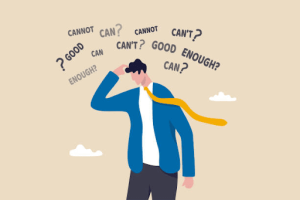Coping With Your Inner-Critic and Improving Your Self-Esteem

Imagine being stuck in an elevator with your worst enemy. Now imagine that the enemy is actually your own mind.
Yup, that’s your inner critic right there, the voice in your head that just won’t quit. Call it your inner critic, judge, saboteur, or superego. This roommate of yours is always ready with a snarky comment, a harsh judgement, and a never-ending stream of negativity. It’s like having a personal heckler, 24/7! We know it can be pretty annoying but don’t worry, it’s not just you – we all have an Inner Critic living rent-free in our brains! And here’s the thing – this inner critic isn’t just a nuisance, it can actually have a serious impact on your self-esteem. And while it may not be the most pleasant housemate, with a little humour and self-awareness, we can learn to coexist and even become friends.
So, let’s put on our detective hats, investigate this inner nuisance’s struggles, and see if we can find a way to live in harmony with our self-esteem.
What’s My Inner Critic and What Does It Do?
Your inner critic is a negative voice in your head. In psychology, this is known as negative self-evaluation. Engaging in it repeatedly eventually leads to a poor self-image and makes it difficult to live joyfully and confidently. Ignoring the critical voice does not always make it go away. And well, isn’t “acknowledging” the first step in “dealing”? So there you have it! Let’s introspect and check the roots of this inner voice first.
If generous and unselfish behaviour was recognised and cherished in your childhood, and your caregivers anticipated generous behaviour from you, your inner critic would have noted every time you stole the largest piece of cake for yourself or refused to let your sister play with your toys. It would have told you that you were not behaving the “correct” way and would have admonished you about it.
So, most psychologists think that our inner critics have their origins in childhood. Hearing harsh insults and criticism regularly as a child might alter brain development. As we develop into adulthood, we internalise this offensive language, and it becomes our inner critic and the lens through which we see the world. Let’s get practical for a moment to understand this better.
In reaction to new experiences, the brain forms neural networks. When an experience is repeated, the neural pathway is reinforced. The prefrontal cortex, the part of the brain responsible for conscious decision-making and emotion modulation, does not mature until age twenty-five. Now imagine hearing these repeated harsh statements and criticism throughout your developmental period- it might foster a mindset conducive to self-limiting thoughts, low self-esteem, anxiety, and depression, right? We are all aware that society teaches us to conform to unreasonable norms. So, things like societal scripts also add up. However, we occasionally forget that they are man-made and accept them as “the only appropriate way to do things.” Gender roles are a good example.
But here’s the catch – it may seem like it is your real inner voice however, this inner critic is not a trustworthy moral guide like your conscience. On the contrary, the critical inner voice is demeaning and punishing, and it frequently drives us to make poor choices. These negative voices tend to amplify our feelings of self-hatred rather than push us to change unwanted characteristics or act constructively. So if you have the following thought patterns, your inner critic is to blame!
1. Negative self-talk: The inner critic often generates negative thoughts and beliefs about oneself, leading to feelings of inadequacy and low self-esteem. Negative self-talk may sound something like: “You’re never going to finish this book. You don’t have the talent to be a successful writer. You’re just wasting your time.”
2. Perfectionism: The inner critic may urge people to strive for perfection, which can lead to irritation and worry if perfection is not attained. “This is a poor painting. It must be perfect or it is not worth doing. If you can’t get this right, you’ll never make it as an artist.”
3. Fear of failure: The inner critic can make people fearful of making mistakes, which leads to inactivity and stagnation. “You’re going to make a mistake on stage. Everyone will realise you’re not as good as you believe you are. You should simply give up before you embarrass yourself.” This is how your failure dread might sound.
4. Lack of confidence: An individual’s confidence can be eroded by the inner critic, leading to feelings of uncertainty and self-doubt. It may say something like this: “You have no idea what you’re doing. You’re not the right person for this position. You’re going to screw this up.”
5. Difficulty with decision-making: The inner critic may cause individuals to question their choices and decisions, leading to indecision and frustration. “What if I make the wrong choice? Will I regret it forever? This or That? How Do I choose? I am not capable of making the right decision.”
6. Low self-esteem: The constant negativity generated by the inner critic can result in low self-esteem and a negative self-image. “It was nothing” or “I didn’t do that well.” When a person has low self-esteem, they may struggle to ask for what they need. People with low self-esteem may be more likely to engage in what is known as upward social comparison or compare themselves to people who they think are better than themselves. They might also have a problem voicing their opinions. “You’re going to say something stupid. You don’t know what you’re talking about.”
Our critics, believe it or not, ultimately want us to be happy. It wants us to have everything we want, yet it often communicates in a negative way. Taming your inner critic may seem complicated, but it is doable, the brain can be re-trained over time thanks to neuroplasticity. So consider these suggestions the next time your inner critic speaks up!
How Can You Tame Your Inner Critic?
Now that you know where your inner critic comes from and what it does, it’s time you take some mindful action. Here are some helpful strategies!
- Sit your Critic on a Chair- Treat it mindfully!
The first step in taming your inner critic is becoming aware of it and its negative thought patterns. Because these constant judgments have been with us since early childhood—this running critical commentary feels natural.
Pay attention to your internal narrative and catch yourself when you’re being too critical. Recognize that just because you have opinions and judgements does not always mean they are correct. You have enormous control over how you respond. Will you opt for love or shame?
Impersonate your critic into something stupid if you wish to further disempower it. Psychologist Rick Hanson recommends visualising it as a cartoon villain. You can draw it on a piece of paper and place it next to you to talk to it.
This may appear ridiculous, but it works. Try listening to what your inner critic says about you in that amusing, cartoonish voice. You can also comment and argue with your critic if you desire. The entire event should put some distance between you and your negative ideas.
Adopting an ACT technique is the most effective strategy to learn to disable our inner critic. This method entails identifying and labelling the inner critic, observing what it does without judgement, and then letting it go.
- Stop Ruminating- Be In The Here And Now
When you make a mistake, your inner critic wants to point it out to you. It may feel natural to mentally re-live the situation in order to discover a solution. However, the inner critic frequently concentrates on scolding rather than solutions. This will only make you feel worse and will not address your problem.
When you feel yourself ruminating, ask yourself what you can do to help yourself in the present now. If you feel helpless, go for a stroll, call a friend, or stay with your experience as it is and breathe deeply. Your inner critic and ruminating are a pattern; they do not define you.
- Treat It Like A Child- Treat It With Empathy And Compassion
Express compassion for out-of-control feelings: “I understand you are terrified of getting rejected—it is painful. I know you’re trying to protect me.” Try responding to yourself the same way you would a friend or a child—speak to her with compassion. And remember your critic developed in childhood and carries with it parts of your inner child so choose your words wisely and be kind. Imagine how you might deal with a struggling friend. What would we say to them? What tone of speech would we use? Next, consider how we speak to ourselves, particularly when we are struggling. The majority of us will be taken aback by the difference.
- Challenge Your Critic- Let’s Face It
Our natural tendency is to try to suppress or dismiss our inner critic. Many of us are taught to conceal our emotions and sentiments, so it seems logical to try to disavow a part of ourselves that makes us unhappy. This, however, does not work with the inner critic. The converse occurs: the more you ignore your inner critic, the stronger it becomes.
Instead, examine the evidence and challenge its voice. If your critic claims that you will never advance in your career or that you will be unmarried forever, look for evidence to support or disprove this assertion.
This allows you to address the matter from the reasoning side of your brain while keeping your thoughts apart from your emotions. You can even actually look in the mirror while you do this. When you look in the mirror, you can see yourself as the victim of your own criticism. This is really effective in activating that self-nurturing voice. Self-compassion can emerge naturally once you become aware of how hard you can be on yourself.
- Create a supportive inner voice and seek out new experiences:
Create a helpful inner voice that is encouraging and upbeat. To cultivate this inner voice, employ affirmations or positive self-talk. Your supporting inner voice can help calm your inner critic over time. Take on new and challenging situations that will push you out of your comfort zone. This can help you gain confidence and a sense of success, which can offset your inner critic’s negative self-talk.
If your inner critic is having a major impact on your life, seeking professional help can be beneficial. A therapist can help you learn new coping strategies and develop a more positive relationship with yourself.
Here are some book recommendations to fuel the process:
- “The Inner Critic Solution: A Revolutionary Program to Turn Self-Doubt into Self-Confidence” by Hal Stone and Sidra Stone
- “The Self-Esteem Workbook” by Glenn R. Schiraldi
- “The Confidence Gap: A Guide to Overcoming Fear and Self-Doubt” by Russ Harris
- “Mindfulness: An Eight-Week Plan for Finding Peace in a Frantic World” by Mark Williams and Danny Penman
We understand that controlling your inner critic is a never-ending task, but implementing these creative and interesting tactics can help you silence its negative voice and increase your self-esteem.
Take Charge of Your Inner Critic. Get Started Now!
Now that you know of the many ways to help quiet your voice, get started! And if you need additional support, don’t hesitate to seek help from a mental health professional. Remember, you deserve to live a life free from negative self-talk. So don’t let your inner critic hold you back, take control of your thoughts and start your journey to a happier, more fulfilling life today! If you need guidance or assistance- be it career related or about your own strengths and weaknesses- we are here for you! Sign up with Mentoria to get customised development plans, guidance in shortlisting your ideal career paths, mentorship until you get into a career path you love, and a lot more!












